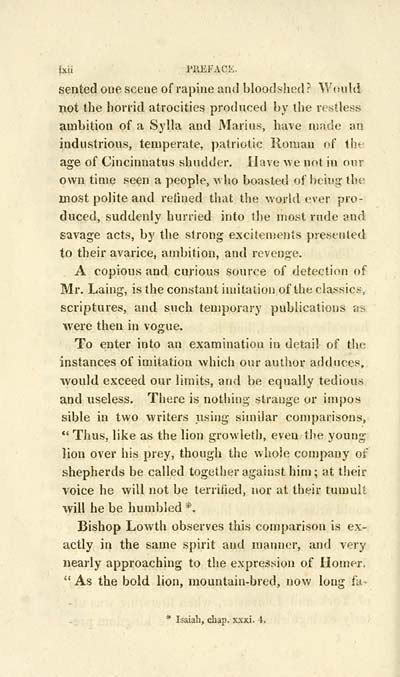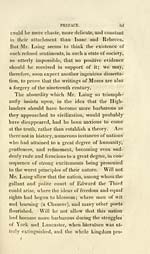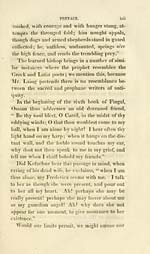Ossian Collection > Original collection of the poems of Ossian, Orrann, Ulin, and other bards, who flourished in the same age
(66)
Download files
Complete book:
Individual page:
Thumbnail gallery: Grid view | List view

ixii WlEFACt:.
sented one scene of rapine and bloodshed? Would
not the horrid atrocities produced by the restless
ambition of a Sylla and Mar i us, have mnde an
industrious, temperate, patriotic Roman of the
age of Cincinnatus shudder. Have we not in our
own time seen a people, who boasted of being the
most polite and relined that the world ever pro-
duced, suddenly hurried into the most rude and
savage acts, by the strong exciteujents presented
to their avarice, ambition, and revenge.
A copious and curious source of detection of
Mr. Laing, is the constant imitation of the classics,
scriptures, and such temporary publications as
were then in vogue.
To enter into an examination in detail of the
instances of imitation which our author adduces^
would exceed our limits, and be equally tedious
and useless. There is nothing strange or impos
sible in two writers using similar comparisons,
*' Thus, like as the lion growleth, even the young
lion over his prey, though the whole company of
shepherds be called together against him ; at their
voice he will not be terrified, nor at their tumult
will he be humbled *.
Bishop Lowth observes this comparison is ex-
actly in the same spirit and manner, and very
nearly approaching to the expression of Homer.
"As the bold lion, mountain-bred, now long fa-
* Isaiah, chap. xxxi. 4.
sented one scene of rapine and bloodshed? Would
not the horrid atrocities produced by the restless
ambition of a Sylla and Mar i us, have mnde an
industrious, temperate, patriotic Roman of the
age of Cincinnatus shudder. Have we not in our
own time seen a people, who boasted of being the
most polite and relined that the world ever pro-
duced, suddenly hurried into the most rude and
savage acts, by the strong exciteujents presented
to their avarice, ambition, and revenge.
A copious and curious source of detection of
Mr. Laing, is the constant imitation of the classics,
scriptures, and such temporary publications as
were then in vogue.
To enter into an examination in detail of the
instances of imitation which our author adduces^
would exceed our limits, and be equally tedious
and useless. There is nothing strange or impos
sible in two writers using similar comparisons,
*' Thus, like as the lion growleth, even the young
lion over his prey, though the whole company of
shepherds be called together against him ; at their
voice he will not be terrified, nor at their tumult
will he be humbled *.
Bishop Lowth observes this comparison is ex-
actly in the same spirit and manner, and very
nearly approaching to the expression of Homer.
"As the bold lion, mountain-bred, now long fa-
* Isaiah, chap. xxxi. 4.
Set display mode to: Large image | Transcription
Images and transcriptions on this page, including medium image downloads, may be used under the Creative Commons Attribution 4.0 International Licence unless otherwise stated. ![]()
| Early Gaelic Book Collections > Ossian Collection > Original collection of the poems of Ossian, Orrann, Ulin, and other bards, who flourished in the same age > (66) |
|---|
| Permanent URL | https://digital.nls.uk/77725531 |
|---|
| Description | Selected books from the Ossian Collection of 327 volumes, originally assembled by J. Norman Methven of Perth. Different editions and translations of James MacPherson's epic poem 'Ossian', some with a map of the 'Kingdom of Connor'. Also secondary material relating to Ossianic poetry and the Ossian controversy. |
|---|
| Description | Selected items from five 'Special and Named Printed Collections'. Includes books in Gaelic and other Celtic languages, works about the Gaels, their languages, literature, culture and history. |
|---|

